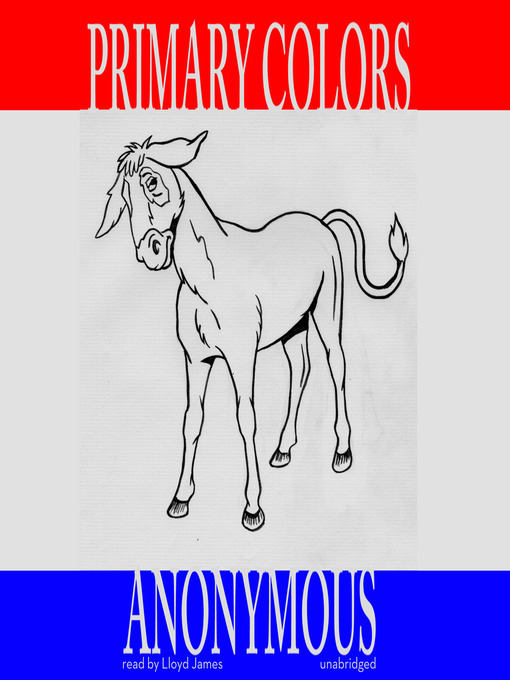Primary Colors has its rich rewards as a savvy insider's look at life on the stump. But it travels far beyond mere gossip and exposé to discover a convincing world of its own, peopled by smart cookies, nutcases, and wheeler-dealers, whose public and private lives illuminate each other—sometimes by casting dark shadows. This story spans the novelistic spectrum from bedroom farce to high moral drama, and it paints a picture of the political state of the nation so vivid and authentic that one finds in it the deepest kind of truth—the kind of truth that only fiction can tell.
-
Creators
-
Publisher
-
Release date
August 6, 2012 -
Formats
-
OverDrive Listen audiobook
- ISBN: 9781483053486
- File size: 425810 KB
- Duration: 14:47:06
-
-
Languages
- English
-
Reviews
-
Publisher's Weekly
Starred review from January 1, 1996
The circumstances behind this crackling, highly perceptive study of a presidential campaign that remarkably resembles Bill Clinton's are bizarre. We are assured that not even its publisher, Harold Evans, who signed the book, or its editor knows the identity of the author. A third party, independent of both the publisher and the author's agent, verified his (or her) credentials and oversaw the contract signing. All this has naturally led to the assumption that the author may be someone highly placed in Washington, possibly even within the Clinton Administration; the intimate knowledge of Washington folkways the narrative exhibits seems to bear that out. On the other hand, the literary sophistication on display-the shaping of the story, the characterizations, the atmosphere, the dialogue-is so considerable it seems a professional writer must be at work. But while the mystery may help galvanize sales, it does not affect the quality of the book, which stands as a definitive political novel for these uneasy times-a novel that's knowing about the easy abuse of sincerity, the overblown role of the media (all reporters are ``scorps,'' short for scorpions), the readiness to confuse means with ends. Henry Burton, the narrator, is a bright, youngish black man who rises quickly to a key position on the presidential primary campaign staff of Jack Stanton, governor of a small Southern state. Stanton is a brilliant portrait of a born politician, a man at once deeply calculating and genuinely spontaneous in his human reactions; his wife, Susan, a smart lawyer, despises his louche sexual adventuring but is driven by her own demons. Around them revolves a superbly observed staff, a mixture of deep cynicism, muddled idealism and, in the person of Libby, a ghost from Stanton's past who is at once explosively funny and tragic, a compulsive seeker of the truth. Stanton's fortunes fluctuate wildly in the campaign as he slogs through New Hampshire, endures a drubbing in New York (where a governor not unlike Mario Cuomo decided not to run) and seems to cause a heart attack in a buttoned-down rival in Florida. This inspires the entry of a mystery candidate with a magic touch, who turns out, in one of the novel's few overplotted passages, to have his own complex problems; the resolution, however, strikes just the right uneasily ambiguous note. Throughout the book, the attention to physical and emotional detail in the draining political process, the sparkling intelligence and-through the use of Henry as hero-the unusual empathy with which a range of African Americans are portrayed suggest a very considerable new novelist. -
AudioFile Magazine
This now famous work of (mostly?) fiction portrays the primary presidential campaign of a young Southern Governor named Jack Stanton through the eyes of savvy operative Henry Burton. This is difficult for a reader because of its many characters. About ten major and countless minor characters include Jack Stanton, other candidates, media figures like Ted Koppel, and campaign operatives like James Carville. James does a remarkable job with the many voices, most of which are quite good, and is at his best with the Carville character. James switches with ease from character to character and chooses appropriately, making an entertaining audiobook that is often difficult to turn off. M.L.C. (c)AudioFile, Portland, Maine -
AudioFile Magazine
A bravura performance by Blair Underwood highlights a political odyssey that just happens to resemble the Clinton campaign of '92. Underwood brings several voices, accents and larger-than-life characters to this profanity-laced pot-boiler. The presentation starts with patriotic fanfare but otherwise is unobtrusive, giving way to a lurid story line, which tortures the limits of plausibility. While this document may not stand as history or literature, Underwood succeeds in creating the heat and passion that is the true heart of politics. J.W. (c)AudioFile, Portland, Maine -
AudioFile Magazine
So this is what they sound like when reporters and photographers aren't around! The triumph of Primary Colors is that it makes readers feel they have an inside seat at a contemporary presidential campaign, whose candidate is strikingly reminiscent of the current occupant of the White House. And James's performance is a perfect complement. He richly inhabits the fascinating, driven characters who are determined to make Jack Stanton, governor of a small Southern state, the next president. M.O. (c)AudioFile, Portland, Maine
-
Loading
Why is availability limited?
×Availability can change throughout the month based on the library's budget. You can still place a hold on the title, and your hold will be automatically filled as soon as the title is available again.
The Kindle Book format for this title is not supported on:
×Read-along ebook
×The OverDrive Read format of this ebook has professional narration that plays while you read in your browser. Learn more here.


